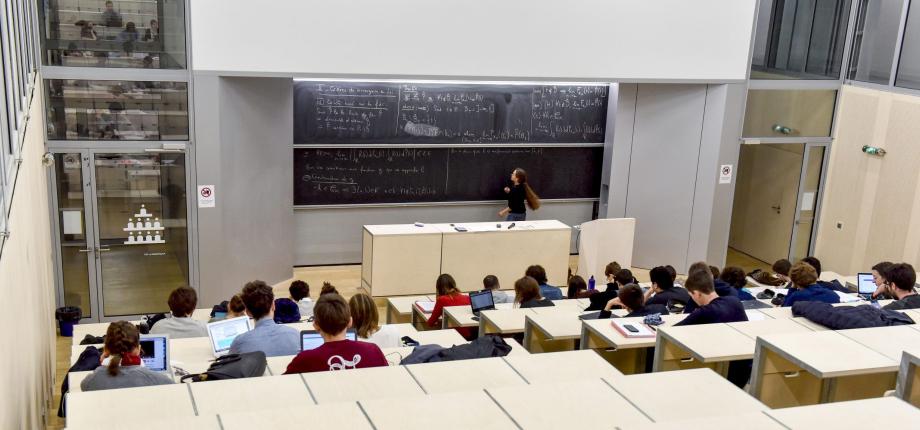First year

The first semester of the first year is a transition period between the preparatory classes and the ENSAE curriculum itself. It aims to harmonize the knowledge in economics and mathematics of students from the mathematics and economics preparatory classes, while allowing them to deepen their knowledge in their original field:
In the first semester:
- Students from scientific preparatory classes (1A Math) discover economics (introduction to economics, history of economic facts, descriptive economics dissertation, economics seminar) and sociology (introduction to social sciences), and take in-depth courses in mathematics that are essential for their subsequent studies at ENSAE (functional and convex analysis, mathematical foundations of probability). They also take a course in algorithms and programming in Python.
- Students coming from business or literary preparatory classes (1A Eco, EC/S exam and Khâgnes B/L) follow additional courses in algebra, analysis, differential calculus, theory of measurement, and an introduction to computer science.
All students take common courses in economics (banking economics), social sciences (introductory lectures on contemporary societal issues), statistics (univariate descriptive statistics with SAS), languages and sports.
The second semester is devoted to an introduction to the school's fundamental disciplines (microeconomics, macroeconomics, probability theory, differentiable optimization, introduction to statistics and econometrics, numerical analysis and applications). Opening courses include a course in physics applied to the social sciences, an introduction to data ethics and law, and a course in the history of economic analysis (1A Math) or an introduction to databases (1A Eco). They also complete a programming project of their choice, and take two language courses, two soft skills courses, and a sports course.
The year concludes with an internship to open up the professional world.
* Option to take this course instead of a language course if C1 level is achieved and certified
| Course | Course hours | Tutorials hours | ECTS |
|---|---|---|---|
| UE1-06TC – Applied Mathematics | 10 | ||
| Introduction to Statistics | 18 | 18 | 3 |
| Optimisation | 21 | 16,5 | 3 |
| Probability Theory | 30 | 28,5 | 4 |
| UE1-07TC – Foundations of economic modeling | 8 | ||
| Introduction to macroeconomics | 24 | 18 | 3 |
| Introduction to microeconomics | 24 | 22,5 | 3 |
| Economics of banking and financial markets | 12 | 0 | 2 |
| UE1-08TC – Projects and electives | 6.5 | ||
| Introduction to ethics and data law | 12 | - | 1 |
| Pogramming project | 0 | 18 | 3 |
| Introduction to environmental issues | 15 | 1,5 | |
| Entrepreneurship Seminars | 6 | - | 0,5 |
| History of economic analysis (MATH track) | 18 | 0 | 1 |
| Databases initiation (ECO track) | 6 | 12 | 1 |
| UE1-09TC – Human Development | 4.5 | ||
| English | 1h30 or 3h/week | - | 2 |
| Foreign Language 2 | 1h30 or 2h/week | - | 2 |
| Additional courses in humanities | 18 | 1,5 | |
| Interpersonal and communicational skills – 2nd module* | 9 | 1 | |
| Sports | 1 session/sem | - | 0.5 |
* Option to take this course instead of a language course if C1 level is achieved and certified
| Course | Course hours | Tutorials hours | ECTS |
|---|---|---|---|
| HEC/ENSAE 1st Semester | 20 | ||
| Linear Algebra | 24 | 1 | 5 |
| Analysis | 33 | 27 | 6 |
| Differential and Integral Calculus | 9 | 10 | 3 |
| Introduction to computer science (ECO track) | 7 | 21 | 3 |
| Mathematical foundations of probabilities | 18 | 16 | 3 |









